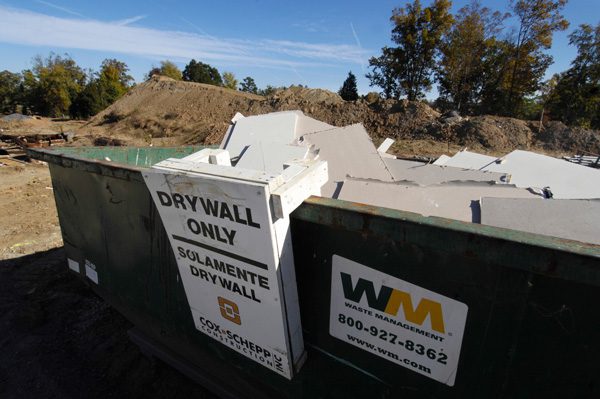Lacking incentives, some Mecklenburg businesses lag in recycling

In Charlotte-Mecklenburg, local ordinances do not require all businesses to recycle, and even when large companies provide space for employees to toss materials into bins, officials are unable to determine how much they recycle.
In Charlotte and the county’s six towns, there is no requirement that apartments, townhouses, condos and other multifamily communities provide on-site recycling services to those hundreds of thousands of residents. Of course, those residents who may not have the option of tossing recyclables in containers where they live can opt to drive to recycling drop-off centers spread throughout the county.
KEEPING WATCHThis article is part of the three-year KEEPING WATCH initiative. Learn more about the initiative at keepingwatch.org. Other articles: What about schools? |
A 10-year Mecklenburg County solid waste management plan, adopted in 2012 by all local jurisdictions, recommends considering more stringent regulations for businesses and multifamily communities as a way to increase recycling. The plan encourages officials to consider such proposals as requiring all businesses to meet an established recycling rate, and requiring recycling collection at all multifamily complexes.
Solid waste officials say residents often need tougher incentives to recycle. In areas across the country where mandatory policies and tighter guidelines have been adopted, recycling rates have increased.
Nearly 12 years ago, Charlotte-Mecklenburg elected officials adopted an ordinance requiring businesses throughout the county that generate 16 cubic yards or more of waste each week to recycle office paper and corrugated cardboard. At the time, the constraints of recycling processing equipment then in use resulted in an exemption for companies producing less than 500 pounds of cardboard and paper per month.
An estimated 4,900 business now must comply with the ordinance by recycling office paper and cardboard, but thousands of smaller businesses don’t have to comply. Many businesses recycle additional items voluntarily, however.
Officials would like to see some revisions in the ordinance, says Laurette Hall, environmental manager for Mecklenburg County Solid Waste Services, and are likely to make some recommendations to the Charlotte City Council, town councils and county commissioners. Such changes would require recycling at smaller businesses generating at least 8 cubic yards of waste weekly, and businesses would be asked to expand to recycling mixed paper, such as magazines. That change would affect nearly 2,000 small businesses.
“This is what many businesses in the community are already doing,” says Hall.
While businesses overall can do a better job, and through a county recognition program encourages them recycling, according to Hall the effort is challenging. “Individuals are responsible for making the choice of putting an item in a garbage container or a recycling container,” she says.
Under state law, businesses are not required to report how much they recycle, but all garbage dumped in landfills must be recorded. As a result county officials can calculate the reduction in commercial waste: It has dropped 46 percent since 1998. But that figure includes yard trimmings that are now diverted from landfills, and so it does not necessarily reveal a recycling rate.
In multifamily properties with 30 units or more, Charlotte provides recycling service by contract and is serving more than 110,000 units. Previous contracts set recycling targets, but in recent years they were removed because of low results. In the other six Mecklenburg municipalities, government services for multifamily vary from recycling collection provided to townhouses only, to no collection.
Until recently, countywide efforts to encourage recycling among residents in multifamily communities have been minimal. A new initiative has been launched to create more awareness about the benefits of recycling.
County data show that the tonnage of recyclables processed from multifamily communities is increasing. The tonnage for fiscal year 2012 was up 15 percent from July to January, compared to the same months in fiscal year 2009.